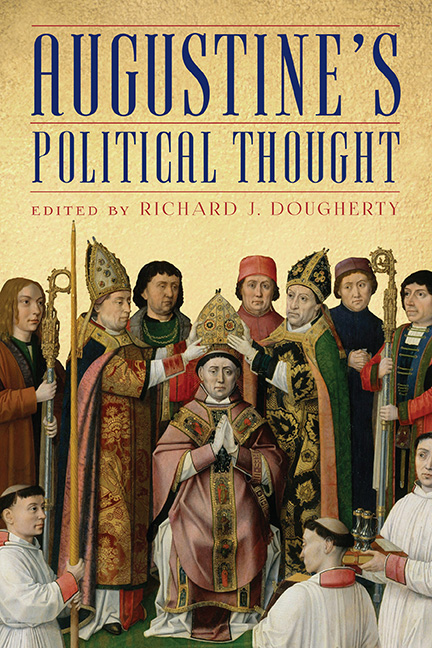Book contents
- Frontmatter
- Contents
- Acknowledgments
- Introduction
- Part 1 Politics, Nature, and Virtue
- Part 2 St. Augustine and Ancient Political Philosophy
- 6 The Few, the Many, and the Universal Way of Salvation: Augustine's Point of Engagement with Platonic Political Thought
- 7 Echoes and Adaptations in Augustine's Confessions of Plato's Teaching on Art and Politics in the Republic
- 8 Truth, Lies, Deception, Esotericism: The Case of St. Augustine
- 9 Augustine's Ciceronian Response to the Ciceronian Patriot
- 10 Augustine's City of God and Roman Sacral Politics
- 11 Augustine and Platonic Political Philosophy: The Contribution of Joseph Ratzinger
- Notes on Contributors
- Index
9 - Augustine's Ciceronian Response to the Ciceronian Patriot
from Part 2 - St. Augustine and Ancient Political Philosophy
Published online by Cambridge University Press: 26 June 2019
- Frontmatter
- Contents
- Acknowledgments
- Introduction
- Part 1 Politics, Nature, and Virtue
- Part 2 St. Augustine and Ancient Political Philosophy
- 6 The Few, the Many, and the Universal Way of Salvation: Augustine's Point of Engagement with Platonic Political Thought
- 7 Echoes and Adaptations in Augustine's Confessions of Plato's Teaching on Art and Politics in the Republic
- 8 Truth, Lies, Deception, Esotericism: The Case of St. Augustine
- 9 Augustine's Ciceronian Response to the Ciceronian Patriot
- 10 Augustine's City of God and Roman Sacral Politics
- 11 Augustine and Platonic Political Philosophy: The Contribution of Joseph Ratzinger
- Notes on Contributors
- Index
Summary
Reading Augustine's City of God is like walking into an auditorium where a skilled orator is passionately addressing a diverse crowd. One finds oneself quite aware one is not the intended audience, but with the sense his message is still somehow relevant. At times, one is drawn in, seeing elements of one's own concerns in those of his audience and feeling his prose stir the heart. At others, one finds his arguments elusive and his rhetoric jarring. One wishes one could better understand their context in order to grasp his message more fully.
Because Augustine is a true rhetorician—a careful student of his audience's loves, longings, and very soul—it can be difficult to interpret his thought, particularly his political thought. It is not surprising, then, that there is much debate about what Augustine's political teaching is or whether he even has one. Some scholars, such as Ernest Fortin, Michael Foley, and Mary Keys, read Augustine to be developing the tradition begun by classical political philosophy. Others, such as Herbert Deane, Reinhold Niebuhr, and R. A. Markus, read Augustine as breaking with this tradition, offering instead a proto-modern analysis of political life. Finally, some, such as Peter Brown and John Milbank, find Augustine to be too pessimistic about politics to have formulated a political theory independent of his ecclesiology.
Accordingly, with a view to understanding Augustine's political thought, I approach his City of God with the premise that Augustine's writings become more accessible when we pay as much attention to his audience as he did. Though the City of God masterfully addresses multiple audiences at the same time, here I focus on one: the virtuous Roman patriot.
Moreover, I study this patriot as a Ciceronian, not because Cicero was his only influence, but in recognition of the “extraordinary grip” that Cicero “had upon the imagination of posterity.” Even in Augustine's day, Cicero's writings remained influential, forming an integral part of Augustine's own education. Yet, more than this, as Rome's preeminent philosopher-statesman, Cicero inspired Romans, even in the imperial age, to pursue the beata vita of noble citizenship.
It is clear that Augustine recognizes those who pursue this life as serious and respectable interlocutors. In his exchange with Nectarius, an elderly patriot who had written regarding the prosecution of an anti-Christian mob, this respect is palpable.
- Type
- Chapter
- Information
- Augustine's Political Thought , pp. 200 - 221Publisher: Boydell & BrewerPrint publication year: 2019
- 1
- Cited by

